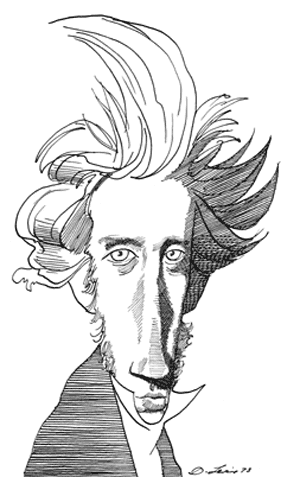A Little English Magic
 Somewhere at the fringe of my mind resides an unmoored remembrance of an article read. Unmoored because I can't remember the reference. In it, the author, a Christian, takes issue with the strain of fundamendalist extremism that has placed Harry Potter on the blacklist for many deprived home-schooled children. Instead of thinking of magic as the devil's handiwork, the author would have us consider that prior to the scientific revolution in, say, the 18th century, magic was considered just as productive an avenue of research as science. The practice of alchemy, for instance, by luminaries as great as Newton himself, was consistent with what people knew about the world. Once the gears of industry and technology began to turn, however, moderism took hold and magic was forever banished from perceived reality. Books like Harry Potter ask us to suspend our disbelief in magic, and imagine a world where science did not win out over its more romantic adversary. All this to introduce another great book concerning magic, this one envisioning an England of the early 19th century where magic has not so much withdrawn itself from the public eye, as in the Potter series, but rather fallen into disuse.
Somewhere at the fringe of my mind resides an unmoored remembrance of an article read. Unmoored because I can't remember the reference. In it, the author, a Christian, takes issue with the strain of fundamendalist extremism that has placed Harry Potter on the blacklist for many deprived home-schooled children. Instead of thinking of magic as the devil's handiwork, the author would have us consider that prior to the scientific revolution in, say, the 18th century, magic was considered just as productive an avenue of research as science. The practice of alchemy, for instance, by luminaries as great as Newton himself, was consistent with what people knew about the world. Once the gears of industry and technology began to turn, however, moderism took hold and magic was forever banished from perceived reality. Books like Harry Potter ask us to suspend our disbelief in magic, and imagine a world where science did not win out over its more romantic adversary. All this to introduce another great book concerning magic, this one envisioning an England of the early 19th century where magic has not so much withdrawn itself from the public eye, as in the Potter series, but rather fallen into disuse.Susanna Clarke's mammoth Jonathan Strange & Mr. Norrell tells the story of two "practical" magicians who enter the limelight during the Napoleonic Wars and garner fame both for themselves and their profession at a time when none but the library-warming, stodgy "theoretical" magicians retain any interest in the subject. Many subplots ensue and the eponymous magicians run up against a deeper, darker magical reality in England than what they had been playing at previously. That's all I will say about the plot, which is solid in spite of its sometimes rambling, episodic nature.
After I finished the novel, which due to reader negligence took more than a year, I read a symposium over at Crooked Timber (see "Addictive Blogs" at right) that engaged the book on several different levels. It was actually quite interesting because Clarke herself responded to the articles. One of the contributors wrote about an ulterior theme he saw in the novel, on classism in England. While Clarke was demure regarding her intentions for such a theme to be read into the story, she did not deny that she included a commentary on classism, however limited. Servant Such-and-such is unfairly treated, goes on to become a king, that sort of thing. Or perhaps she is more trenchant than that. Jonathan Strange, an obvious choice for the hero of the novel, is not so much more virtuous than Mr. Norrell (endearingly repugnant, in his own way) when all the data are considered. Clarke reveals a nuanced, slippery world of appearances and pretences where morality and class level do not necessarily go hand in hand. And this may have been what prompted some reviewers to compare her to Jane Austen.
Lionel Trilling once wrote an essay on the differences between English and American novels, with a view to explaining why American novels will never be as great as those of the English persuasion. The primary difference, he saw, was that England endured a class system for most of its history, which provided a fertile ground for producing novels bent on exploring what it means to be a civilized human. For indeed, how can one define civilized humanity other than by referring to the appearances and social edifices we put up to hide our inner reality? Although all groups of humans construct these edifices, those living in the upper class tend to do so with bewildering complexity. Trilling defined a novel as that specific art form which examines this phenomenon, and the moral compromises that result when the edifices are brought into conflict with the underlying self. Apparently, this type of art flowed down to us from the playwrights of antiquity, whose primary struggle worked itself out as the protagonists arbitrated between living as an animal - wild, free, and indifferent to morality - and living in a city, which is derived from a facade-like construction out of the comparatively formless elements of nature. If Trilling's definition of a novel is allowed to stand, and it indeed comes down to us from these ancient sources, perhaps America's offerings in this department will always be skewed. Our class system is very different in that it revolves around money - who has it, who's getting it - more than birthright and pedigree. Nouveau riche are not really despised, as America's fascination with People magazine proves. Consider the vehemence with which American films attack the classist sentiment (e.g. Titanic and The Notebook, to name a few).
What does this mean for American readers of Jonathan Strange & Mr. Norrell? Simply that the milieu she portrays is utterly foreign to us. Even the way she writes betrays her deep English sensibility. She has a penchant for understatement, even in the midst of momentous events. She actually digresses on arcana via footnotes during the climax of the novel, something an American author would tend not to do (this may have to do with the sensibilities of American readers more than anything else, of course). This tendency toward understatement is a tangible hint that appearances and facades inform her understanding of the world, or at least the world she is describing, reacting against, rehabilitating. A good way to detect her views is to be on the lookout for discrepancies between characters' words and actions. The volume is not a moral tale, but definitely has that element within it. A contributor on the Crooked Timber project I mentioned above wisely noted that novels cannot be reduced to moral tales, precisely because they are stories and deal with characters who are no less real because they are imagined. Jonathan Strange & Mr. Norrell is no exception, but it should be noted that any lessons to be learned are not obstructed, but only enhanced, by the very entertaining characters, plotline, set pieces, and dialogue.
- Roger Dixon






